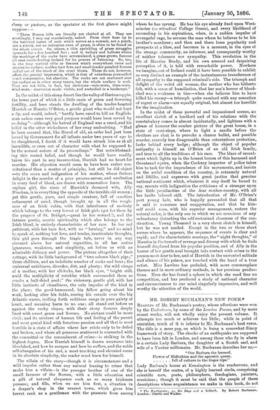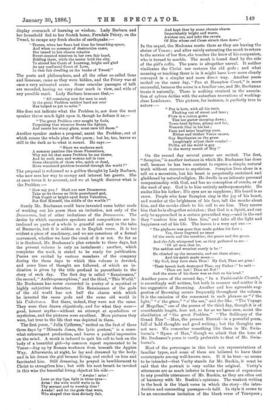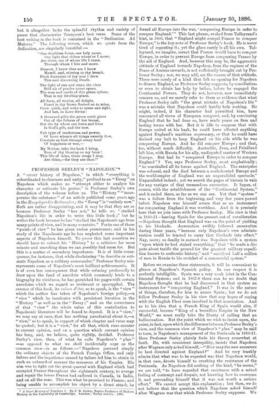MR. ROBERT BUCHANAN'S NEW POEM.* READERS of Mr. Buchanan's poetry,
whose affections were won by the Undertones, by some of the London Poems, and by more recent works, will not wholly enjoy the present volume. It attempts too much or achieves too little; while in point of execution, much of it is inferior to Mr. Buchanan's best verse. The title is a mere peg, on which is hung a somewhat flimsy framework of story. The shocks of an earthquake are supposed to have been felt in London, and among those who fly in alarm is a certain Lady Barbara, the daughter of a Scotch earl, and wife of a Yankee millionaire. Mr. Buchanan describes her as,— " Our Barbara the learned,
Flower of Midlothian and the agnostic queen,
fall of culture to the finger-tips."
Lady Barbara's house at Kensington is the rendezvous, and she is herself the centre, of a highly learned circle, comprising- scientific men, poets, philosophers, theologians, painters, musicians ; though it must be said that the people of these descriptions whose acquaintance we make in this book, do not • The Earthquake ; or, Six Data and a Sabbath. By Robert Buchanan. London : Matto and Winans.
display overmuch of learning or wisdom. Lady Barbara and her household fled to her Scotch home, Ferndale Priory, on the Tweed, to escape any fresh shocks of earthquake :—
" Thence, when her fears had time for breathing-space,
And when no message of destruction came, She issued to her chosen votaries Sweet-scented missives in her own fair hand, Bidding them, while the terror held the city, To attend her Court of Learning, bright and glad As any media3val Court of Love, In that fair dwelling on the banks of Tweed."
The poets and philosophers, and all the other so-called lions and lionesses, came as they were bidden, and the Priory was at once a very animated scene. Some oracular passages of talk are recorded, having no very clear mark in view, and wide of
any possible mark. Lady Barbara bemoans that,—
" All remaining now for men to seek Is the great Problem neither bard nor seer Has helped as yet to solve."
She does not indicate what the Problem is, nor does the next speaker throw much light upon it, though he defines it as,—
" The great Problem ever sought by fools, Forgetting that whoever fronts the Sphinx,
And meets her stony glare, mast rave till doom."
Another speaker makes a proposal, anent the Problem, out of which comes the whole plan of the poem ; but he, too, leaves us still in the dark as to what is meant. He says :—
" Since we moderns seek
A summer pastime like those Florentines, Why not let that same Problem be our theme, And let each man and woman tell in turn Some chronicle of those who, quick or dead,
Have wandered problem-haunted through the world P".
The proposal is welcomed as a golden thought by Lady Barbara, who now sees her way to occupy and interest her guests. She at once turns it to account, and we at length discover what is the Problem :—
" How say you ? Shall our new Decameron Take as its theme no little pasteboard god, Pink Cupid or bright-eyed Saint Valentine' But God Himself, the riddle of the worlds?"
Surely Mr. Buchanan could have invented some better mode of working out his poem than an imitation, not only of the Decameron, but of other imitations of the Decameron. The device by which successive speakers and compositions are in- troduced as parts of a whole is graceful and easy in the tales of Boccaccio, but it is seldom so in English verse. It is too evident a piece of machinery, and we are conscious of a formal movement, whether we bear the creak of it or not. So far as it is disclosed, Mr. Buchanan's plan extends to three days, but the present volume is only an instalment ; another, which completes the work, is stated to be ready for publication. Poems are recited by various members of the company during the three days to which this volume is devoted, and some lines of thought are followed, of which an in-
dication is given by the title prefixed in parenthesis to the story of each day. The first day is called "Renaissance," the second, " Anthropomorphism," and the third," This World." Mr. Buchanan has never succeeded in poetry of a mystical or .highly subjective character. His Renaissance of the gods of the old world has not half the charm with which he invested the same gods and the same old world in his Undertones. But there, indeed, they were not the same. They were then drawn objectively, and for what they were— good, honest myths—without an attempt at symbolism or mysticism, and the pictures were excellent. Mere pictures they were, but true to the life that was depicted in them.
The first poem, "Julia Cytherea," recited on the first of these three days by "Miranda Jones, the lyric poetess," is a some- what extravagant production, and leaves a painful impression on the mind. A monk is induced to quit his cell to look on the body of a beautiful girl—by common report represented to be Venus—dug up by Roman workmen from beneath the Appian Way. Afterwards, at night, he lay and dreamed by the body, and in his dream the girl became living, and smiled on him and
fascinated him. Still dreaming, he prayed in bewilderment to Christ to strengthen him ; but with his next breath he invoked in this wise the beautiful living object at his side :—
" Awake ! arise ! Love on thy lips, light in thine eyes— Arise ! the wide world waits to be
Thy servant and to worship thee !
Awake ! and let the gods that were, Who shaped thee thus divinely fair,
And kept thee by some chemio charm Imperishably bright and warm, Awaken too, and take the crown Of Him whose red Cross struck thee down."
In the sequel, the Madonna meets them as they are leaving the shrine of Venus ; and after vainly entreating the monk to return to the service of her Son, she touches the brow of his companion, who is turned to marble. The monk is found dead by the side of the girl's coffin. The poem is altogether unreal. It neither
vindicates the Christ nor restores the old gods ; and what meaning or teaching there is in it might have been more clearly conveyed in a simpler and more direct way. Another poem recited on the same day, "Pan at Hampton Court," is more successful, because the scene is a familiar one, and Mr. Buchanan treats it naturally. There is nothing strained in the associa- tion of sylvan deities with the suburban recreations of working- class Londoners. This picture, for instance, is perfectly true to nature :—
" Pan is here, with all his train Flocking out of street and lane ; Flora in a cotton gown Ties her garter stooping down ; Town-bred Sylvan, plump and fat, Weareth lilac in his hat ; Faun and satyr laughing pass,
Hither and thither Venus roams, Gay Bacchantes on the grass
Laughingly adjust their combs !— Phillis, all the world is gay In the merry month of May !"
On the second day several poems are recited. The first, "Serapion," is another instance in which Mr. Buchanan has done well, because he has been content to express a simple, natural truth without recourse to mysticism. Serapion lives alone in a cell on a mountain, but his heart is perpetually sustained and gladdened by natural religion. He dwells in an intimate personal companionship with God, and has no conception of creeds, or of the need of any. God is to him entirely anthropomorphic. He smiles like his father; His eyes are as sapphires ; His beard is as snow. People who hear Serapion sing in the joy of his heart, and wonder at the brightness of his face, tell the monks about him, and the monks climb to his cell to see him. They assure him that he is altogether mistaken ; that God is a Spirit, and can only be approached in a certain prescribed way,—and in the end they "confess him and bless him," and take all the light and happiness out of his life. The lesson is a very apt one :—
"The gladness was gone that made golden his face ; Yea, there lingered no trace
Of the smile and the sunshioc, the peace and the grace.
And the folk whispered low, as they gathered to see- ' Of all men that be, The saddest and weariest surely is be ! '
He climbed up the mountain, and sat there alone; And his spirit made moan—
My God, they have slain Thee ! My God, Thou art gone !
'Their breath hath destroyed Thee, my Father !' be said- ' Thou art lost ! Thou art fled ! '
And the sense of his doom was as dust on his head."
Another poem of the second day," In a Fashionable Church," is exceedingly well written, but both in manner and matter it is too suggestive of Browning. Another and less agreeable sug- gestion of Browning occurs frequently throughout the volume. It is the omission of the consonant in such phrases as " the light," "o' the grass," "o' the sea," and the like. "The Voyage of Magellan," one of the poems of the third day, though it is of considerable length, does not, so far as we have seen, assist the elucidation of "the great Problem." "The Soliloquy of the Grand ntre "—Man, the present Eternal—is a powerful poem, full of hold thoughts and good writing ; but the thoughts are not new. We remember something like them in Mr. S win- burne's "Hymn of Man," though we admit that the tone of Mr. Buchanan's poem is vastly preferable to that of Mr. S win- burne's.
Most of the personages in this book are representatives of familiar types, and some of them are believed to have their counterparts among well-known men. If it be true—as seems to be intended—that Verity stands for Mr. Ruskin, it must be said that the portrait is very unlike the original. Verity's utterances are as much inferior in form and grace of expression to any possible utterances of Mr. Ruskin, as they are often out of harmony with Mr. Ruskin's opinions. The weakest writing in the book is the blank verse in which the story—the intro- duction and connecting passages—is told. In style it seems to be an unconscious imitation of the blank verse of Tennyson ;
pause that characterise Tennyson's best verse. Some of the best writing in the book is contained in the "Dedication. Ad Matrem." The following verses, which we quote from the dedication, are singularly beautiful :—
"One deathless flame, one holy name, One light that shines where'er I move, Are thine, out of whose life I came, Through whom I live and move.
Dearest, I knew thee ere I knew
Myself, and, stirring to thy breath, From fountains of thy soul I drew
This soul discerning Death.
The light of sun and stars, the clear Still air of yonder azure space, The seas and sands of this green sphere, That is my dwelling-place.
All form, all motion, all delight, Fused in thy frame flashed on to mine, Grew quick, and woke to sense and sight, And last, to Love divine!
A thousand gifts the green earth gives Out of the fnlneas of her breast, But she by whom one loves and lives Is God's gift, and the best.
Fair type of tenderness and power, Of Love whence all things sweetly flow, Constant as God through every hour
Of happiness or woe,—
My Mother, take the book I bring, Sure of thy blessing on my brow ! This life of mine, these songs I sing, Are thine,—for they are thou!"




































 Previous page
Previous page